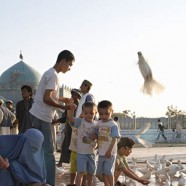
Anna Elliot ’03 inspires young entrepreneurs
In hindsight, Anna Elliot’s reality TV series might seem like a media mogul’s strategy to build market share in developing countries. A reality television competition for aspiring and inspiring entrepreneurs, the first program aired in Afghanistan on the largest national channel and featured 20 entrepreneurs pitching and launching their social ventures.
What Anna did intend, with her countercultural program, was to leverage the power of real people telling real stories. These stories, she thought, might help hatch others’ latent entrepreneurial spirit. They might loosen the grip of unconscious biases, like those tied to gender or class. If people could find the right skills, resources and, ultimately, confidence, she thought, perhaps they could begin to reshape their lives and rebuild their country.
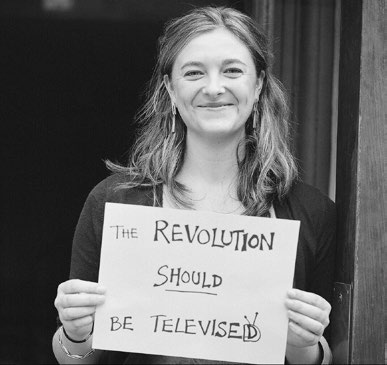
When they gathered to accept their fellowships, the Echoing Green fellows introduced themselves by presenting, individually, “Why Do You Do What You Do?” Contradicting the widely known song “The Revolution Won’t Be Televised,” Anna’s sign captured her notion that the inevitable revolution of profound social change “should be televised.” Little did she know that the Arab Spring would occur six months after this photo was taken, and she would find herself working in Egypt.
Like many great ideas, this one surfaced in an offhand comment. “What you really need, Dad, is a reality TV show,” Anna said one day in 2008. She was commiserating with her father, who was frustrated with his work on economic development in Afghanistan. Need and opportunity were both vast in Afghanistan, but barriers of all kinds—political, structural, cultural—seemed to confound progress.
At the time, Anna was involved in bringing an Afghan troupe’s staging of Shakespeare’s Love’s Labour’s Lost “on the road.” The Kabul production of the play, translated into Dari by
a theater director Anna knew, had gained international attention. Anna’s role in the project was part of culminating work toward her bachelor’s degree. For Anna, college was less a collection of courses aimed at a certain competency, and more a multidisciplinary journey that merged theoretical study and hands-on experiences all over the world (and took almost eight years to complete). An accomplished painter, Anna wrestled relentlessly with a persistent question: How can my artistic skills, and my hunger for the creative process, address social change?
She pursued this question through work in painting, drawing, sculpture, film, video, theater and performance. She also took courses in history, conflict resolution and diverse cultural traditions.
Storytelling—the myths, folk stories and traditions thriving all over the world—finally emerged as the medium that best addressed her insistent question. I was “captivated,” she wrote in a retrospective, “by the tremendous influence and intensity of oral narratives.” The world continues to find connection and healing through stories. Consider truth and reconciliation commissions, for instance. Astonished publics in many countries, including South Africa, Rwanda, Guatemala, have witnessed dramatic personal narratives in forums set up to help individuals and societies recover from mass violence.
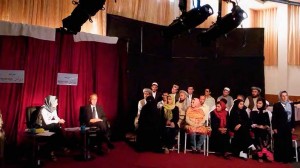 Anna’s top-of-mind idea about reality TV grew legs. Why not come up with a program like “Afghan Star,” Afghanistan’s version of “American Idol,” that could relate to real economic need? With a grant from a development agency, Anna carried through an early prototype of what would become a national program. This first version was aired by a local station; it linked storytelling with real-time efforts to create small, sustainable businesses. That was groundbreaking, in a country without a word to describe the idea of an entrepreneur. The experience was “pretty wild,” Anna said, and “very experimental.” It was the source of the idea for Bamyan Media, Anna’s production enterprise that produced the national hit “Dream and Achieve” and won the support to move the template to other developing countries.
Anna’s top-of-mind idea about reality TV grew legs. Why not come up with a program like “Afghan Star,” Afghanistan’s version of “American Idol,” that could relate to real economic need? With a grant from a development agency, Anna carried through an early prototype of what would become a national program. This first version was aired by a local station; it linked storytelling with real-time efforts to create small, sustainable businesses. That was groundbreaking, in a country without a word to describe the idea of an entrepreneur. The experience was “pretty wild,” Anna said, and “very experimental.” It was the source of the idea for Bamyan Media, Anna’s production enterprise that produced the national hit “Dream and Achieve” and won the support to move the template to other developing countries.
To produce the series, Anna partnered with Tolo TV, the top Afghan network; recruited judges from the business, banking and academic sectors; and with a novel outreach program, interviewed hundreds of potential program contestants. Fast Company reports that Anna “ended up driving from village to village for in-person meetings with local leaders and trade organizations. In the process, she gained an intimate understanding of the roadblocks to success: How does a carpet weaver navigate the USAID grant process? What questions do bankers ask a leather maker when he’s taking out a loan? How does microfinance work?”
Anna is not a huge television fan; she doesn’t watch it. “But it has the potential to be an agent for profound social change,” Anna says. “It’s a universal storytelling blaster. No matter how poor you are, you probably have a TV in your home. It’s creating the stories of today, the stories that are shaping your world.”
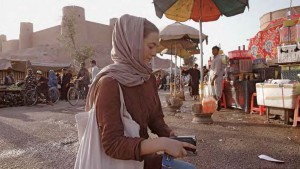 The name Bamyan Media comes from Bamyan Province. “The first place we started casting,” Anna says, “called into question the typical notions of ‘development,’ the paradigm that drives international economic development agencies.” These typical notions are complicated by the way people live their lives. “This province is in the central mountains, located on what was the Silk Route. It is home to the Hazara ethnic minority, the underdogs of Afghanistan, who suffer prejudice and have survived a violent past. Yet, they’re one of the most resilient communities. Bamyan has the highest rate of literacy, the greatest number of women in local government, no poppy growth, and a strong tradition of enterprising merchants who continue to rebuild their land time and time again after centuries of conquest.”
The name Bamyan Media comes from Bamyan Province. “The first place we started casting,” Anna says, “called into question the typical notions of ‘development,’ the paradigm that drives international economic development agencies.” These typical notions are complicated by the way people live their lives. “This province is in the central mountains, located on what was the Silk Route. It is home to the Hazara ethnic minority, the underdogs of Afghanistan, who suffer prejudice and have survived a violent past. Yet, they’re one of the most resilient communities. Bamyan has the highest rate of literacy, the greatest number of women in local government, no poppy growth, and a strong tradition of enterprising merchants who continue to rebuild their land time and time again after centuries of conquest.”
After the success of “Dream and Achieve,” Anna earned an Echoing Green Fellowship and a Rainor Arnholds Fellowship for her work. Both foundations honor social change agents. Her awards enabled her to move the format to Egypt, where Bamyan (now including 20 staffers) has been working steadily and sensitively on producing “El Mashroua,” which means “The Project” in Arabic. (There is no direct translation for entrepreneur, let alone social entrepreneur, in Arabic.) In Egypt, “The Project” will be airing on the country’s largest TV channel this spring. Bamyan has adapted the format to the local context, including episode “challenges” such as setting up a catering or T-shirt business in 48 hours; or planning a local wedding; or renovating a restaurant for reopening. The three judges weigh in. They consider issues like how well the contestant knows his market; or how viable the business plan is; or what kind of jobs she is trying to create. The final three episodes film the three remaining contestants as they launch their “Mashrouas” (Projects). Television shows need real drama, real action to win audiences, after all.
The goal is to stoke innovation and provoke the attitude change that may become behavior change. Help (how to take out a loan, go to a workshop, find a mentor, register a business) is available directly from the program Web site and from more than 60 civil society partners in the entrepreneurial ecosystem for anyone who wants to take a project from idea to action.
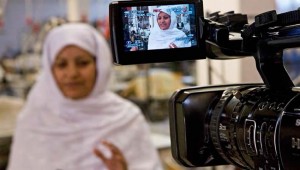 About becoming a social entrepreneur, Anna says, “The first couple of years are about learning, learning, learning—then developing resources, then scaling. Egypt has so many active agendas, deep-rooted systemic problems, profound economic challenges and social disparity. People are desperately looking for a way out of this quagmire, and the West is not really an example. Class segmentation is intense, the economy is largely informal, and gender affects every part of the fabric of society. Figuring it all out is tough. In the end, all this is embedded in a TV show, which we have to cast and shoot in real time, with contestants (characters) who are both acceptable to social norms and challenge the status quo enough to open some eyes.”
About becoming a social entrepreneur, Anna says, “The first couple of years are about learning, learning, learning—then developing resources, then scaling. Egypt has so many active agendas, deep-rooted systemic problems, profound economic challenges and social disparity. People are desperately looking for a way out of this quagmire, and the West is not really an example. Class segmentation is intense, the economy is largely informal, and gender affects every part of the fabric of society. Figuring it all out is tough. In the end, all this is embedded in a TV show, which we have to cast and shoot in real time, with contestants (characters) who are both acceptable to social norms and challenge the status quo enough to open some eyes.”
Bringing an idea to life from the ground up calls for skills, passion and courage. Listening is the essential but often missing ingredient that Anna highlights. “A dynamic must exist between listener and storyteller in order for the story to come alive. The storyteller has to create space for that listening to happen; the listener has to be open, and access the space, in himself, for that story to take root.
“Our target audience is youth,” Anna explains, “people 14 to 35. Research shows that 13-year-olds are already heavily influenced by screens. We want to get to young people before they go to university. When they come out, they’ll have few realistic options, and they will need to create their own opportunities.”
Anna will not yield on her resilient question: her measure for this effort, or any that follow, is whether it has major social impact. “Bamyan is the model we’ve come up with thus far,” Anna explains. The model can’t get to the whole picture of what an inclusive, sustainable, diverse economy would look like, but it tries to approach those issues. It has social impact and can work within the parameters of an industry that Anna believes is limited by an outmoded, uninspired paradigm.
Facing intractable problems with innovative, out-of-the-box approaches is not everyone’s idea of a career. Anna foretold her own future, however, when she wrote to the chair of the department at Hampshire College that would grant her bachelor’s degree. Describing her first project in Afghanistan, she said:
“My most significant and life-altering education occurred during that short amount of time in which I have never worked so hard nor felt so alive. I learned that anything is possible. That nothing will go as planned, and there is no room for expectations. One is better off being open to the mystery and potential of each moment. Cultivating an endless reserve of determination, courage, and repertoire of jokes, and recognizing that ‘Allah truly is kind.’ Yet it is necessary to organize and respect even the minutest details, defend against the smallest injustices, and pray regularly. Somehow this process contributes to miracles occurring on a daily basis, which they do.”
— Cathleen D. Everett



